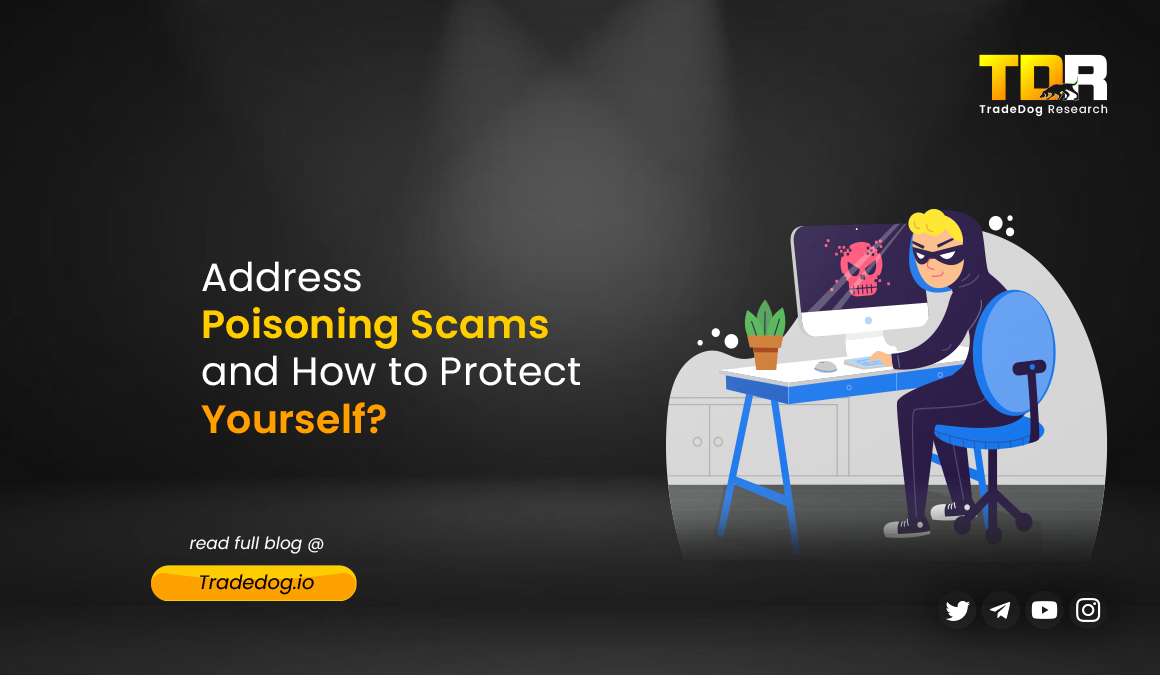Quick Links
In the world of cryptocurrency, where funds are exchanged through digital addresses, security is paramount. One cunning scam tactic that preys on user carelessness is address poisoning. Let’s delve into how this scam works, the tricks scammers use, and how you can safeguard your hard-earned crypto.
Understanding Address Poisoning
Imagine your cryptocurrency wallet as a bank account, but instead of an account number, you have a long, alphanumeric address. These addresses, typically around 42 characters, can be daunting to remember, leading most users to rely on copy-and-paste for transactions.
Address poisoning exploits this very behavior in different ways. The scammers may target users by sending negligible value transactions to their wallet addresses. These transactions, often disguised as zero-token transfers or dust (very small amounts), land in your transaction history. The scammer’s trick lies in the address they use for this transaction.
Scammers also create a spoofed address using vanity address generators. These addresses closely resemble your actual address, often differing by a single character in the middle while maintaining the beginning and end sequences. This similarity increases the chance that you’ll mistakenly copy the scammer’s address when making a future transaction.
Here’s how it works:
- The Infiltration: The scammer initiates a transaction, sending a negligible amount of cryptocurrency (often zero) to your wallet address. This transaction infiltrates your transaction history, creating the illusion of legitimacy.
- The Lookalike: The scammer utilizes a “vanity address generator” to create an address that closely mirrors your actual address. These deceptive addresses might share the beginning or end characters, making them appear genuine at a glance.
- The Trap is Set: With the fake address nestled amongst your transaction history, the scammer waits for you to copy an address for a future transaction. In haste, you might inadvertently copy the scammer’s address instead of your own.
- The Loss: Unaware of the mistake, you unknowingly send your valuable cryptocurrency to the scammer’s address. Since blockchain transactions are irreversible, recovering these lost funds can be extremely difficult, if not impossible.
The consequence of such a mistake can be devastating. Since cryptocurrency transactions are irreversible, any funds sent to the wrong address, in this case, the scammer’s address, are lost forever. And the unfortunate truth is that address poisoning scams are more common than you might think. A recent example highlights this risk. An unfortunate user fell victim to an address poisoning scam, accidentally sending a whopping $71 million worth of cryptocurrency to the scammer’s address.
How to Protect Yourself?
Fortunately, there are steps you can take to mitigate the risk of falling victim to address poisoning:
- Double and Triple Check Every Address: This might seem obvious, but it’s the most critical defense. Before pasting an address, meticulously compare every single character to the original address you intend to send to.
- Minimize Address Reuse: While convenient, using the same address for multiple transactions can make it easier for scammers to target you. Consider generating a fresh address for each transaction, especially for high-value transfers.
- Consider Hardware Wallets: Hardware wallets offer an extra layer of security. When making a transaction on a hardware wallet, you’ll typically need to physically confirm the recipient address on the device’s screen, reducing the risk of accidentally sending funds to the wrong address.
- Use Address Book Features: Many cryptocurrency wallets allow you to save frequently used addresses in an address book. This eliminates the need to copy and paste from your transaction history, reducing the chance of accidentally copying a scammer’s address.
- Test Transactions (Optional): For high-value transactions, consider sending a small test amount to the recipient address first. This can help verify if the address is correct before committing a larger sum.
The Antidote
Recognizing the growing threat of address poisoning, Binance, a leading cryptocurrency exchange, has taken a proactive step. “Antidote” – a sophisticated algorithm designed to detect spoofed blockchain addresses, the very foundation of address poisoning scams. These spoofed addresses closely resemble legitimate wallet addresses, hoping to trick users into accidentally sending their cryptocurrency to the scammer’s address instead of their intended recipient.
How Does the Antidote Work?
The Antidote employs a multi-pronged approach to identify these deceptive addresses:
- Suspicious Transaction Detection: The algorithm keeps a watchful eye on transfers, particularly those involving negligible amounts or unfamiliar tokens. These transactions might be red flags for potential poisoning attempts.
- Connecting the Dots: Once a suspicious transaction is flagged, the Antidote examines the recipient’s address. It compares it with the user’s transaction history, searching for potential matches. This helps identify if the suspicious address exhibits a suspicious resemblance to addresses the user has interacted with previously.
- Time is of the Essence: The Antidote factors in the timing of the suspicious transaction. By pinpointing when the potential poisoning attempt occurred, it can help build a stronger case against the spoofed address.
- Building a Blacklist: When the Antidote successfully identifies a spoofed address, it doesn’t just raise a red flag for the individual user. This information is shared with a wider database, effectively blacklisting the address and protecting other users on the platform, or those who utilize security tools that integrate with this database.
The effectiveness of the Antidote is evident in its real-world application. Since its launch, the algorithm has successfully detected ~13.4 Mn spoofed addresses on Binance Smart Chain and ~1.68 Mn on Ethereum and 300,000 new ones added weekly. This proactive identification helps prevent countless users from falling victim to address poisoning scams.
The Future of Crypto Security
While Binance’s “Antidote” is a positive step, vigilance remains essential. By understanding address poisoning scams, employing the security measures mentioned above, and staying updated on the latest industry developments, you can significantly reduce the risk of falling prey to these deceptive tactics. Remember, in the realm of cryptocurrency, a little caution can go a long way in safeguarding your valuable digital assets.









